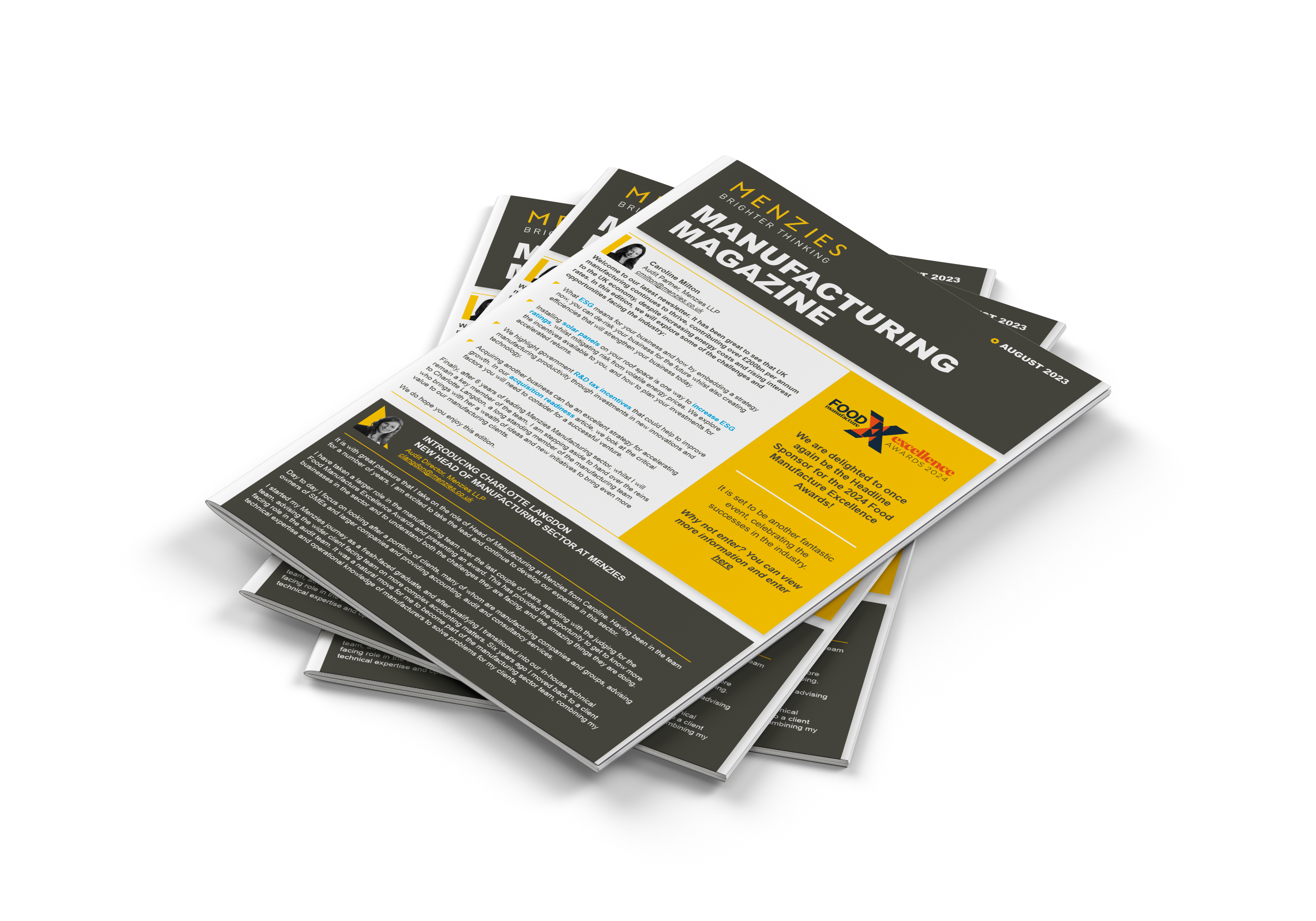Our Manufacturing sector approach
Manufacturing is an important sector for Menzies, and we work closely with our clients through our specialist team to provide them with practical solutions to sector challenges. As the manufacturing sector continues to develop in uncertain times, through technology advancements, global competition, and supply chain disruptions, we continue to provide our clients with timely advice and assistance to enable them to navigate the challenges and optimise opportunities that arise through effective financial management and solid financial data.
Our sector specialist team advise a diverse range of manufacturers, as well as a number of sector-dependent clients. We have experts in business strategy, ESG, mergers and acquisitions, fundraising, and disposals, as well as accounting, audit and tax advice. Our R&D team work closely with our manufacturing clients to ensure they maximise their available reliefs for the technological advancements they make on a daily basis. Our digital transformation team have worked closely with some of our clients to digitalise their factory processes and facilitate better data linkage with their accounting systems, enabling real time information to make more informed business decisions.

A practical guide to developing and enhancing your ESG strategy
Manufacturing a Sustainable Future
Key challenges in the sector
The UK manufacturing sector contributes a significant proportion of UK exports and is growing in industry ranks by value of output. This growth doesn’t come without challenges, such as trade barriers, political instability and keeping pace with technological advances, whilst remaining sustainable. Despite global economic uncertainty, UK manufacturers remain resilient and resourceful. Investment in automation and technology, combined with a focus on high-value manufacturing, is high on the agenda. As the need to be sustainable is becoming essential rather than desirable, more manufacturers are stepping up to meet the environmental concerns – and making cost savings in the process.
There is no shortage of challenges for the sector, and the challenges will be different for each business depending on factors such as location, the specialism of the industry in which they operate, and the dynamics of the market place at any point in time.
EU deal boosts UK Manufacturing growth
We welcome the news of a new UK agreement with the EU which is expected to reduce administrative friction and the cost of trade with EU countries:
- Manufacturers supplying the food and drink industry should benefit from freer movement of animal and plant based products. The #SDS agreement should mean significantly reduced red tape when moving goods to and from the EU;
- From an ESG perspective, the linking of Emissions Trading Systems between UK and EU will help UK businesses to mitigate the costs associated with EU carbon taxes;
- Improvements to Steel quotas provides additional protection from restrictive tariffs;
- Manufacturers supplying the Defence sector will be pleased with the announcement of a new Security and Defence Partnership, which will create opportunities for UK companies to benefit from similar opportunities to their EU counterparts in this sub-sector.
- The UK’s Department for Business and Trade is estimating that UK exporters will avoid roughly £800m of tax payments to the EU in the first year of CBAM which a huge positive for UK businesses.

Our latest insightful newsletter
Manufacturing Magazine
Our Insights

Futureproofing UK Manufacturing – A Resilience-Driven Strategy
Building a resilient strategy: best practices To mitigate these risks and build a futureproof manufacturing…

Manufacturing Sector Challenges
TECHNOLOGY Manufacturers need to utilise the latest technology to stay relevant, innovative and competitive. Their…

Reflecting on a year of Plastic Packaging…
When the UK Government introduced PPT in April 2022, the aim was to encourage the…

Manufacturers – What should you consider in…
Whether you’re considering expanding your geographical footprint, accelerating the growth of an existing revenue stream,…

Manufacturing Sector: Election 2024 Commentary
If you have any queries regarding the 2024 Election, and how it may impact your…

Unlocking Growth: What Food & Drink Manufacturing…
Explore the vital changes that are needed to fuel prosperity in the Food & Drink…

UK Manufacturing: Attractive & Stable
The United Kingdom has long been a hub for manufacturing, with a rich history of…

Effective investments in equipment for manufacturing companies
Read on if you and your manufacturing company falls into one of the following categories:…

Autumn Budget 2024 Commentary: Manufacturing
A key theme of today’s budget was “Invest, Invest, Invest!” with the intention of driving…


